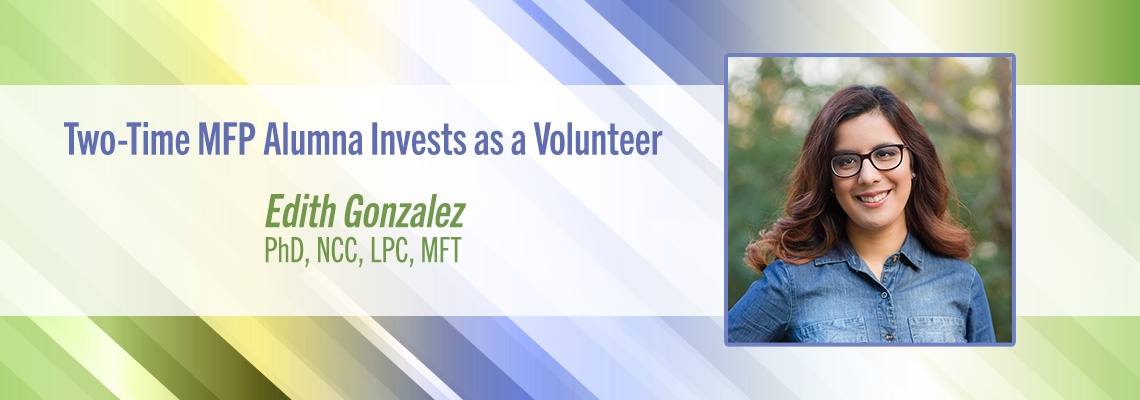
Foundation Connections

Two-time MFP Alumna Invests as a Volunteer
Published 9/21/2020
Dr. Edith Gonzalez’s relationship with the NBCC Foundation began in 2015 when she was awarded a master’s-level fellowship through the Minority Fellowship Program (MFP) and continued as she earned a 2017 MFP Doctoral Fellowship. She is now an assistant professor of counseling at Texas A&M University–Commerce. She holds a BS in psychology from the University of Houston, and an MEd in couples, marriage, and family counseling and a PhD in counselor education and supervision, both from William & Mary. Soon after her time in the MFP, Dr. Gonzalez returned to volunteer with the NBCC Foundation as both an application reviewer and a mentor to current scholars and fellows.
Her dedication to service originated during her youth as a volunteer at church and through opportunities with her high school’s student council. Dr. Gonzalez shared that her family stressed the importance of giving back to the community, specifically to those with lower incomes and limited means.
She notes that her time as a fellow had a tremendous impact on her, which resulted in a shift in her career because of the wealth of professional development opportunities provided. She also realized through her years in the program that she wanted to be involved in volunteer opportunities to help grow future counselors. Dr. Gonzalez holds a unique area of specialty working with Latinx immigrant families and in marriage and family counseling. During her time in the MFP, she was encouraged as she gained exposure to veteran counselors who looked like her and served the same populations.
An early highlight for her once she became a mentor was the realization that she had the ability to guide counselors-in-training who also serve unique but different populations. She uses the IDEAL model as a conceptual framework tool in supervision, which focuses on initiating, planning, and implementing improvement actions. Her mentoring philosophy is to find the developmental needs of the mentee and work with the individual toward advancement.
As a clinical supervisor and mentor, Dr. Gonzalez warns of the reality of impostor syndrome when advancing professionally and stresses the need to take advantage of all available mentoring and supervision. She also recommends becoming comfortable with being uncomfortable, working through blind spots, and building confidence in your clinical abilities.
As a two-time alumna of the MFP, Dr. Gonzalez is familiar with the need to balance professional obligations in order to see the benefits of her efforts. When considering whether to agree to an added task or obligation, she prioritizes by order of importance, potential impact, and need.
She asks herself, “Where do I want to spend my energy?”, “Can I help directly?”, and “Is this whole energy or half energy?” Her desire to directly affect the profession drives her to serve in ways in which the results are visible. She also emphasizes the importance of saying no to requests in order to be more effective in her current projects. This tactic also serves as a self-care protection measure.
Dr. Gonzalez works hard to find a balance while working on a variety of publications. She recently received a 2020 Research Award from the Texas Association for Counselor Education and Supervision and has plans to publish manuscripts focused on aiding undocumented immigrants and training for clinicians working with undocumented immigrants. Because of the impact that mentorship had on her own journey, she also hopes to extend her mentorship to other university students who plan to work with underserved and never-served populations.

